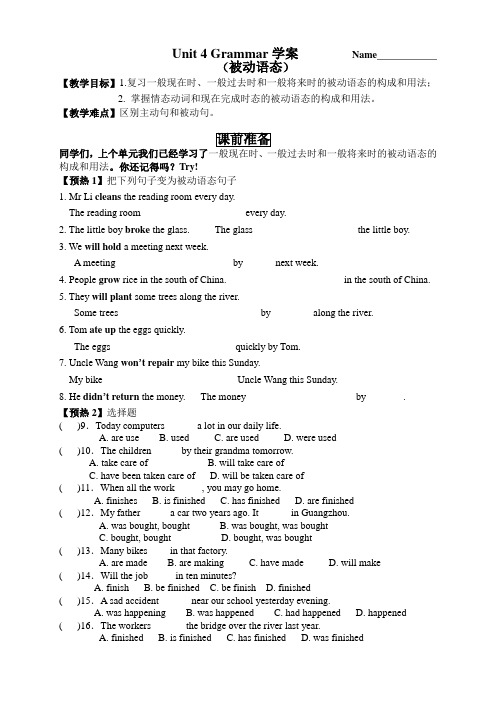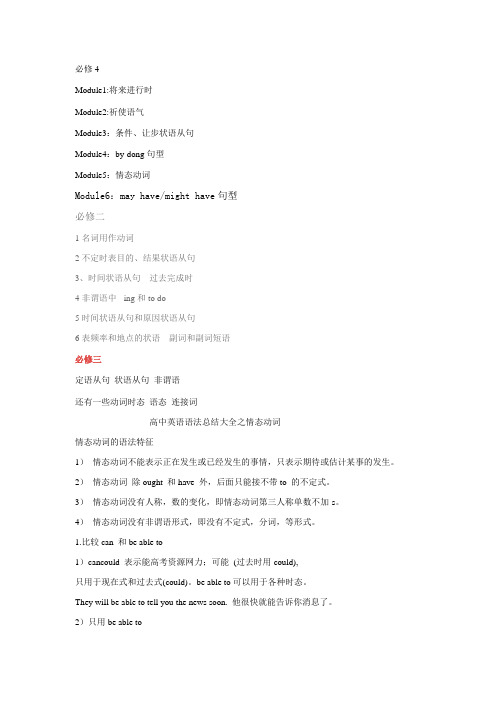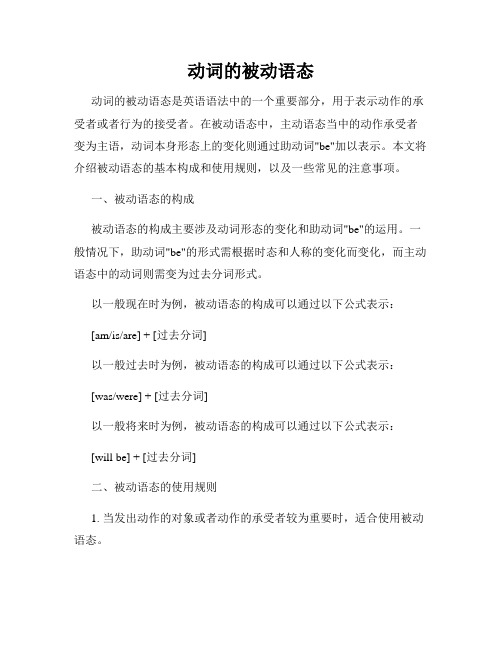4大学英语语法第四讲-动词-被动-情态动词
Unit4Grammar被动语态

Unit 4 Grammar学案 Name____________
(被动语态)
【教学目标】1.复习一般现在时、一般过去时和一般将来时的被动语态的构成和用法; 2. 掌握情态动词和现在完成时态的被动语态的构成和用法。 【教学难点】区别主动句和被动句。
课前准备 同学们,上个单元我们已经学习了一般现在时、一般过去时和一般将来时的被动语态的构成和用法。你还记得吗?Try! 【预热1】把下列句子变为被动语态句子 1. Mr Li cleans the reading room every day. The reading room ____________________ every day. 2. The little boy broke the glass. The glass ____________________ the little boy. 3. We will hold a meeting next week. A meeting _____________________ by______ next week. 4. People grow rice in the south of China. _____________________ in the south of China. 5. They will plant some trees along the river. Some trees____________________________ by________ along the river. 6. Tom ate up the eggs quickly. The eggs ________________________ quickly by Tom. 7. Uncle Wang won’t repair my bike this Sunday. My bike __________________________ Uncle Wang this Sunday. 8. He didn’t return the money. The money _____________________ by _______. 【预热2】选择题 ( )9.Today computers______ a lot in our daily life. A. are use B. used C. are used D. were used ( )10.The children _____ by their grandma tomorrow. A. take care of B. will take care of C. have been taken care of D. will be taken care of ( )11.When all the work _____, you may go home. A. finishes B. is finished C. has finished D. are finished ( )12.My father _____ a car two years ago. It ____ in Guangzhou. A. was bought, bought B. was bought, was bought C. bought, bought D. bought, was bought ( )13.Many bikes ____in that factory. A. are made B. are making C. have made D. will make ( )14.Will the job_____ in ten minutes? A. finish B. be finished C. be finish D. finished ( )15.A sad accident ______near our school yesterday evening. A. was happening B. was happened C. had happened D. happened ( )16.The workers ______ the bridge over the river last year. A. finished B. is finished C. has finished D. was finished 课堂教学 Step1. 小组讨论课前练习部分,分小组展示答案。 Step2. 继续学习被动语态的一些用法 【观察】请你观察以下左右两边的例句的下横线部分,然后完成结论部分的内容。
动词被动语态

动词被动语态
动词被动语态是一种表达句子主语接受动作的句子结构。
在被动语态中,动作的执行者变成动词的宾语,而动作的承受者成为句子的主语。
被动语态的构成为“be动词(am、is、are、was、were)+ 过去分词”。
根据时态的不同,be动词的形式和过去分词的形式也会有所变化。
被动语态的使用可以强调动作的承受者或者省略动作的执行者。
它常
用于以下情况:
1.当动作的执行者不重要或者不知道时;
2.当强调动作的承受者重要时;
3.当句子的主语是动作的承受者时。
被动语态可以用于各种时态,包括现在时态、过去时态和将来时态。
还可以和情态动词以及一些特定的动词(如keep、make、let)连用。
总的来说,被动语态可以使句子更加清晰、简洁,并突出动作的承受
者或者省略动作的执行者。
英语语法中的情态动词用法

英语语法中的情态动词用法在英语语法中,情态动词是一类特殊的动词,用于表达说话者的态度、意愿、推测、能力等。
它们在句子中起到了重要的作用,帮助我们准确地表达自己的意思。
本文将对英语语法中的情态动词用法进行探讨,帮助读者更好地理解和运用这一语法现象。
一、情态动词的定义和特点情态动词是一类助动词,与实义动词不同,它们本身没有词义,只用来表示说话者的态度、意愿、推测、能力等。
英语中常见的情态动词有can、could、may、might、shall、should、will、would、must等。
这些情态动词在用法上有一些特点:1. 情态动词后面一般接动词原形,而不加s/es或ed等变化。
例如:- She can swim.(她会游泳。
)- They should go to bed early.(他们应该早点上床睡觉。
)2. 情态动词本身不具有时态和人称的变化,而是通过后面的动词来表示。
例如:- He will come tomorrow.(他明天会来。
)- They might have finished the work.(他们可能已经完成了这项工作。
)3. 情态动词后面的动词一般不用于被动语态,而是用于进行时、完成时等。
例如:- She can't be sleeping.(她不可能正在睡觉。
)- We should have finished the report by now.(我们现在应该已经完成了这份报告。
)二、情态动词的用法1. 表示能力和能力的推测情态动词can和could用于表示能力,may和might用于表示推测。
例如:- He can speak three languages.(他会说三种语言。
)- She could play the piano when she was young.(她小时候会弹钢琴。
)- He may be busy.(他可能很忙。
)- They might have left already.(他们可能已经离开了。
必修1-4语法 -情态动词、被动语态、直接引语

必修4Module1:将来进行时Module2:祈使语气Module3:条件、让步状语从句Module4:by-dong句型Module5:情态动词Module6:may have/might have句型必修二1名词用作动词2不定时表目的、结果状语从句3、时间状语从句过去完成时4非谓语中-ing和to do5时间状语从句和原因状语从句6表频率和地点的状语副词和副词短语必修三定语从句状语从句非谓语还有一些动词时态语态连接词高中英语语法总结大全之情态动词情态动词的语法特征1)情态动词不能表示正在发生或已经发生的事情,只表示期待或估计某事的发生。
2)情态动词除ought 和have 外,后面只能接不带to 的不定式。
3)情态动词没有人称,数的变化,即情态动词第三人称单数不加-s。
4)情态动词没有非谓语形式,即没有不定式,分词,等形式。
1.比较can 和be able to1)cancould 表示能高考资源网力;可能(过去时用could),只用于现在式和过去式(could)。
be able to可以用于各种时态。
They will be able to tell you the news soon. 他很快就能告诉你消息了。
2)只用be able toa. 位于助动词后。
b. 情态动词后。
c. 表示过去某时刻动作时。
d. 用于句首表示条件。
e. 表示成功地做了某事时,只能用was/were able to,不能用could。
He was able to flee Europe before the war broke out.= He managed to flee Europe before the war broke out.注意:could不表示时态1)提出委婉的请求,(注意在回答中不可用could)。
--- Could I have the television on?--- Yes, you can. / No, you can't.2)在否定,疑问句中表示推测或怀疑。
动词的被动语态

动词的被动语态动词的被动语态是英语语法中的一个重要部分,用于表示动作的承受者或者行为的接受者。
在被动语态中,主动语态当中的动作承受者变为主语,动词本身形态上的变化则通过助动词"be"加以表示。
本文将介绍被动语态的基本构成和使用规则,以及一些常见的注意事项。
一、被动语态的构成被动语态的构成主要涉及动词形态的变化和助动词"be"的运用。
一般情况下,助动词"be"的形式需根据时态和人称的变化而变化,而主动语态中的动词则需变为过去分词形式。
以一般现在时为例,被动语态的构成可以通过以下公式表示:[am/is/are] + [过去分词]以一般过去时为例,被动语态的构成可以通过以下公式表示:[was/were] + [过去分词]以一般将来时为例,被动语态的构成可以通过以下公式表示:[will be] + [过去分词]二、被动语态的使用规则1. 当发出动作的对象或者动作的承受者较为重要时,适合使用被动语态。
例句:The cake was made by my grandmother.(这个蛋糕是我奶奶做的。
)2. 当强调动作的行为者不重要或未知时,适合使用被动语态。
例句:The car was stolen last night.(这辆车昨晚被偷了。
)3. 当句子的主语是不能产生动作的物体时,适合使用被动语态。
例句:The window was broken by the strong wind.(这扇窗户被大风打破了。
)4. 当句子的主语是人的时候,可以使用被动语态,但需注意时态和语态的一致性。
例句:The book will be read by all the students.(这本书将由所有学生阅读。
)三、被动语态的注意事项1. 被动语态中的动词通常不需要与被动的行为者进行逻辑上的一致。
例句:The letter was sent by him.(这封信是他寄出的。
英语被动语态,形式,使用情境,例句,口诀,习题

英语被动语态,形式,使用情境,例句,口诀,习题
决定动词用主动语态还是被动语态主要看动词和主语的关系。
如果主语是动作的执行者,也就是说它们是主动关系,此时动词用主动语态;如果主语是动作的承受者,也就是说它们是被动关系,此时动词则用被动语态。
英语的被动语态由“助动词be+过去分词”构成,其中be有时态、人称和数的变化。
被动语态的时态:
1.一般现在时的被动语态:am/is/are+动词的过去分词
2.一般过去时的被动语态:was/were+动词的过去分词
3.一般将来时的被动语态:will be+动词的过去分词
4.现在进行时的被动语态:am/is/are+being+动词的过去分词
5.现在完成时的被动语态:have/has+been+动词的过去分词
6.情态动词的被动语态:情态动词+be+动词的过去分词
She was not given a paniting by him.This question was not discussed at the meeting yesterday.
(3)一般疑问句:Was/Were+主语+过去分词+by?
Was it made of bamboo?
(4)特殊疑问句:特殊疑+was/were+过去分词+by?
What was it made of?。
情态动词英语语法知识点汇总
情态动词英语语法知识点汇总情态动词(Modal verbs)本⾝有⼀定的词义,表⽰语⽓的单词。
但是不能独⽴作谓语,只能和动词原形⼀起构成谓语。
!以下是店铺为⼤家编辑的情态动词英语语法知识点汇总,希望⼤家喜欢。
1 情态动词的语法特征1) 情态动词不能表⽰正在发⽣或已经发⽣的事情,只表⽰期待或估计某事的发⽣。
2) 情态动词除ought 和have 外,后⾯只能接不带to 的不定式。
3) 情态动词没有⼈称,数的变化,即情态动词第三⼈称单数不加-s。
4) 情态动词没有⾮谓语形式,即没有不定式,分词,等形式。
1 情态动词的语法特征1) 情态动词不能表⽰正在发⽣或已经发⽣的事情,只表⽰期待或估计某事的发⽣。
2) 情态动词除ought 和have 外,后⾯只能接不带to 的不定式。
3) 情态动词没有⼈称,数的变化,即情态动词第三⼈称单数不加-s。
4) 情态动词没有⾮谓语形式,即没有不定式,分词,等形式。
2 ⽐较can 和be able to1)can could 表⽰能⼒;可能 (过去时⽤could),只⽤于现在式和过去式(could)。
be able to可以⽤于各种时态。
They will be able to tell you the news soon. 他很快就能告诉你消息了。
2)只⽤be able toa. 位于助动词后。
b. 情态动词后。
c. 表⽰过去某时刻动作时。
d. ⽤于句⾸表⽰条件。
e. 表⽰成功地做了某事时,只能⽤was/were able to,不能⽤could。
He was able to flee Europe before the war broke out.= He managed to flee Europe before the war broke out.注意:could不表⽰时态1)提出委婉的请求,(注意在回答中不可⽤could)。
--- Could I have the television on?--- Yes, you can. / No, you can't.2)在否定,疑问句中表⽰推测或怀疑。
最新 英语四级语法:情态动词must详解篇-精品
英语四级语法:情态动词must详解篇1、must表示必须,否定回答时用needn‘t. mustn’t表示不许可。
「例如」You must get to the station before 3, otherwise you will miss the train.Must I hand in my homework tomorrow?No,you needn‘t. You can turn it in the day after tomorrow.You mustn‘t s moke in the hospital.2、must用于肯定句,可以表示推测,翻译为:一定或想必。
后面接动词的一般时,表示对现在的推测,接动词的完成式,表示对过去的推测。
对过去的推测是考试的重点。
「例如」:She must live near here, for she comes to work on foot.She was absent from class. There must have been something wrong with her.The light was out. They must have gone to bed.真题:Mary‘s score on the test is the highest in her class. She ____ have studied very hard.(CET-4 1998.1)A) mayB) shouldC) mustD) ought to“must +不定式完成式”表示对过去发生事情的推测。
题意为:玛丽的考试成绩全班第一,她学习一定很刻苦。
答案为C.。
英语语法-情态动词
情态动词构成形式:can , may, must +do现在时Can ---cannot=can’t过去时Could—could not =couldn’tCan you drive a car? 表示能力Yes I can.No, I can’t.May---might (过去时)表示征求别人的意见May I come in?Yes, please./Yes, you may./certainly./That’s all rightNo, you can’t/mustn’t/may not.Must必须、应该(语气很强烈)–mustn’t (不允许,禁止)Must I hand in the paper today?Yes, you must.No, you needn’t.We shall try that Italian restaurant.Shall we try that Italian restaurant?I feel terrible.Do you feel terrible?1.Shall/will/be going to +do表示一般将来是Shall 第一人称Will 第二、第三人称Shall nor=shan’tWill not=won’t2. Shall I(we)…?征询对方意见,意为“我/我们这样做好吗?3. Feel, seem, look, go, get, sound, taste 系动词+ adj.4. with 表示伴随状态,带有,具有的意思I can’t sleep with the lights on.I can’t take a test with the flu. 带着5.W e shall/will eat dinner at that newItalian restaurant.Shall/will+do6. see a doctor 看病/看医生7. one sign of the flu流感的一个症状8. make an appointment with sb. for sb.为某人与某人预约I make an appointment with a dentist for my father.9. have a history test 参加历史考试10. fail a test/pass a test考试不及格/通过考试11. swim across the river/walk across the street12. Italy 意大利Italian 意大利的13.Something urgent 紧急的事情Something interesting 有趣的事情Collect the rubbish收垃圾,Is the rubbish collected in the morning or in the evening?collect the pay 收钱Is your pay collected at the beginning of the month or at the end?Bring the milk to you 送牛奶到你家Is your milk brought to you in the morning or in the evening?Overalls and special shoes must be worn by you.Everything must be kept clean and tidy by you.The equipment must be handled with care by you.Everything must be put back in place by you after it is used.The windows must be closed and the door must be shut by you before you leave.情态动词的被动语态情态动词+be+done1.Africa---African America—American2.deliver: 送deliver letters3.mail/post/send a letter 寄一封信receive/get a letter 收到一封信4.Letters are delivered.How are letters delivered?How 表示方式、方法4.I live far from my company.live far from…. 住在离。
英语语法-情态动词
A. Yes, I won’t
B. No, I won’t
C. No, I will
D. Yes, I will
6. We __C__ last night, but we went to the concert instead.
A.must have studied B. might study
C. should have studied D. would study
(3)would可表示过去反复发生的动作或某种倾向。 Would表过去习惯时比used to 正式,且没有“现已 无此习惯”的含义。
During the vacation he would visit me every week. (4) 表示估计或猜想。
I thought he would have told you all about it.
5.The street are all dry. It couldn’t have rained during the night.
3. 表责备时:
may/might have +ed(语气委婉)过去本 可能…
can/could have +ed (语气委婉) 过去本 能……
should have +ed (语气强烈) 过去本应 该……,而未……
3. The report is written after careful investigation, so it
should be reliable.
4.---I didn’t see Mary at the meeting yesterday.
---She might have been ill, I guess.
